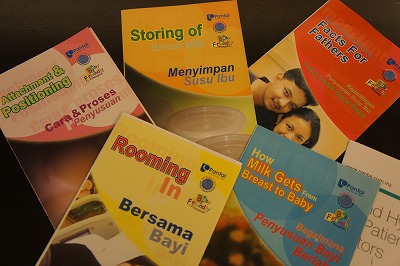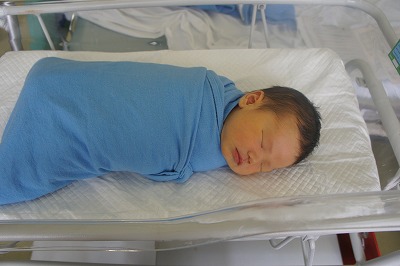Supporting and promoting breastfeeding
Mothers stay with their newborn babies for two hours in the labor delivery room, then move to a regular room. To support breastfeeding, Mother and Child Rooms are recommended at the hospital where I gave birth. In Japan, after I gave birth to my first son, I learned how to breastfeed, change diapers and also about basic care from the midwives at the hospital. However, in Malaysia, mothers are alone with their babies without any instruction straight after the birth. This might be quite overwhelming for a mother who has just had her first baby.
The midwife may take the baby after he has breastfed, but he is back once he has woken up to breastfeed again. Staying in a Mother and Child Room after delivery rather than using a hospital nursery can be exhausting for a mother when her baby does not stop crying because she cannot produce enough milk yet. That said, formula cannot be provided without prior written consent from the mother. When formula is given, cups are used so the baby does not confuse the teat of a bottle with a nipple.
Mother and baby usually stay in hospital only one day after the delivery, so there is not really enough time to receive guidance from the midwives. By global standards, Japan’s system of keeping the mother and baby at the hospital for one week following delivery is probably quite rare. I am interested in the effects of the long hospital stay for mothers and babies in Japan, and I think the guidance program following birth deserves attention.
Lots of pamphlets to promote breastfeeding which advise on the importance of breastfeeding.

Postpartum Care
Malaysia is a multiracial country with the population consisting of 60% Malay, 30% Chinese and 10% Indian. Every race has its own customs, values and beliefs, but all consider postpartum care for the mother to be important.
Mothers leave hospital before complete recovery, so family members offer a lot of support. If it is difficult to get family support, the custom is to employ a professional live-in maid for postpartum care.
People in Malaysia are very friendly and do not hesitate to speak to people even if they do not know them well. I spoke to many people during my pregnancy, and after the birth of my son I received a lot of advice.
My Indian maid and the teachers at my son’s nursery said, “Keep your feet warm. Don’t do any washing or kitchen chores”. A Chinese friend advised me not to go out for one month after the birth and also gave me advice about neonatal jaundice and infantile eczema. Even a Malay taxi driver advised me to limit physical activity and to have a postpartum massage!
I am surprised that so many people in Malaysia care about mothers and their newborn babies, and I have found that I start talking to a lot of different people when I am holding my baby.
My baby is wrapped up tightly at the hospital. Babies seem to be more relaxed when swaddled like this.

Reported by Makiko Wada, Sugahara Institute
